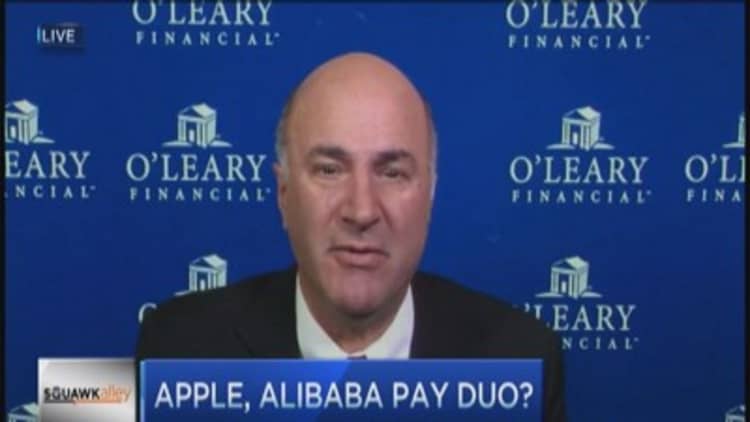China's story has changed from one of rapid expansion to slowing growth, and that could be good news for a problem that has plagued the world's second-biggest economy: intellectual property protection.
"When the economic downturn occurs, the area that innovators turn to is: What can we do to differentiate ourselves," said Don Fancher, who covers intellectual property issues at Deloitte. That is "innovation" and "technology," he said—two areas that require rules designed to protect intellectual property.
Citing 2013 data from the World Intellectual Property Organization, he pointed out that China is leading the world in the number of patent applications and is the fastest-growing nation in terms of filing for trademarks and copyrights. "The quality of intellectual property coming out of China is improving," he said.
Politically, Chinese leaders are realizing the benefits of stronger intellectual property protection as well.
Read MoreIs China's export boom fake?
"The government previously depended on those companies" in real estate and other sectors, said Kan Zu, vice president and partner at Beijing-based law firm Unitalen. With a weaker economy, the focus is on "China's innovation and creativity."
A graduate of New York University's law school, Zu works mostly with foreign clients who tell him that China is on par with other countries' intellectual property protection procedures since cases are often resolved in one year.The legal costs are also lower, and penalties have increased recently.
"China will be an intellectual property-driven economy (like the United States), and in some ways it is. It's also a market where the risk of being a knockoff is significant," said David Hirschmann, president and CEO of the Global Intellectual Property Center at the U.S. Chamber of Commerce. China is "getting better, but enforcement is uneven."
Better, but not perfect

Those are all positive indications for China, but the country still has a long way to go. Fancher noted that it would still be unfair to compare China's copyright protections to those of the United States.
U.S. executives based in China and the United States surveyed this year by the U.S.-China Business Council said their top two challenges were first, competition with other Chinese firms in China, and second, enforcement of intellectual property rights.
In the pharmaceutical industry, for example, some Western companies claim that Chinese firms have unfairly piggybacked off existing research to certify their products with the government, said Joseph Damond, senior vice president for international affairs at the Biotechnology Industry Organization in Washington, D.C.
"This does not incentivize Chinese companies to innovate for themselves and will not lead to a robust world-class biotherapeutics industry in China," he said.
Western firms realize the importance of China's large market, but some have been cautious about moving intellectual property assets into the country.
Read MoreCan China host a smog-free APEC summit?
Most famously, Google pulled out of mainland China in 2010 after intellectual property theft and disputes with the government. The search engine told CNBC this week that it had nothing new to add on the situation.
"Today, China remains the single largest source of counterfeit goods on planet earth," Hirschmann said, adding how some Chinese companies figured out the best-selling products of a foreign upholstery manufacturer and immediately created knockoff versions.
Zu said the primary reason that foreign firms feel their intellectual property is vulnerable is because they don't understand that patent law works differently in China than in the United States and requires local documents.
"I advise any [firms] involved with China: You need to have copyrights in China first," he said.
India scored the lowest and China ranked 17th out of 25 countries for the best intellectual property protection in a global study by Hirschmann's organization.
"Essentially this is not an issue of ability but an issue of willingness," said Fei-Ling Wang, professor of international affairs at the Georgia Institute of Technology. Chinese government officials "definitely have the ability. I have no doubt about that."
Near-term challenges
Despite potentially positive developments on the intellectual property front, a weaker economy will have temporary negative effects for business in China.
"A short-term cyclical downturn in growth is an unavoidable side effect of reforms," Rhodium Group's Dan Rosen said in an email, speaking about President Xi Jinping's move to crack down on corruption, among other measures. "It's good that China is reforming economic regulation, but the burden is on Beijing to show that it can ramp up regulatory activism in an even-handed way that protects foreign firms from being unfairly singled out."
An Oct. 22 study by Rosen with the Asia Society said China's potential GDP growth in 2020 will be 6 percent—if certain strategies are followed. Otherwise growth could fall to 3 percent. A study from the nonprofit Conference Board released on Oct. 20 forecast growth of about 4 percent after 2020.
Read MoreWhy more Chinese stimulus may not be in the cards
Critically, slower growth would create more competition and possibly drive innovation in the long run, but recent improvements in the protection of intellectual property could reverse themselves in select areas, said Georgia Tech's Wang.
When the economy is slowing, and firms are cutting costs as a result, "the companies that were previously paying royalties for copyright [have] less incentive to do so," he said.
CORRECTION: This story has been updated to reflect that all the firms surveyed by the U.S.-China Business Council were U.S. companies.


